Anthony Tattersall, MD of Bicester pallet and parcel carrier Darcica Logistics, is an outstanding example of what can be achieved in the transport industry with ambition and hard work. He drove a truck for a local Palletways member over 20 years ago before moving into the waste management industry and then starting his own firm Darcica Logistics in September 2020, itself now a key member of the Palletways network.
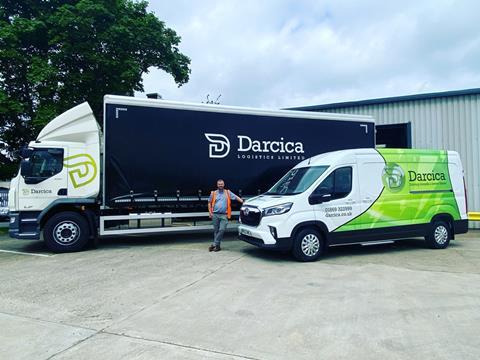
Darcica (pronounced ‘Darsicka’, an amalgamation of Tattersall’s daughters’ names Darcey and Jessica) is run by Tattersall along with his wife and director of sustainability Melanie Tattersall and began as a delivery service partner (DSP) at Amazon’s Swindon DC.
“I worked as a regional manager at Grundon Waste Management for eight years and during Covid the avenues for my growth almost disappeared,” says Anthony. “There was a real opportunity to start with Amazon as a DSP and we began with five routes.
“By Christmas we had 25 and in the first year and a half we were running between 25 and 50 routes a day. Amazon made me an ambassador for the DSP programme, one of 10 out 200-plus partners, and we now operate out of both Swindon and Reading with 40 routes and 80 drivers out of peak season.
“But trucks are my passion - I started out as an HGV driver delivering for Palletways from a depot just over the road in Bicester. After that year and a half with Amazon I wanted to get back into logistics and trucks. Sustainability is another passion of ours – when I was at Grundon we had its first hydrogen-diesel hybrid vehicle.”
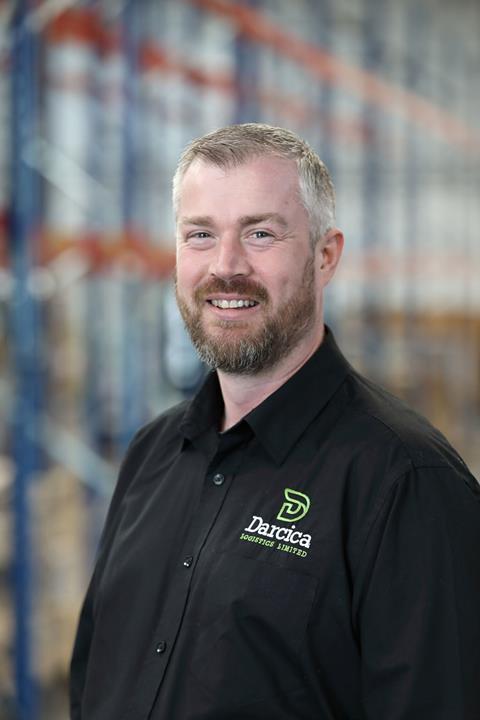
In 2022, the firm moved into a leased 15,000sq ft site on the Launton Business Centre in Bicester that is split into two sections, one for the pallet network operation with Palletways while the other handles the parcels and efulfilment as a network partner of Diamond Logistics. The company offers a bespoke same-day service and does local collections and deliveries on its own vehicles, using a range of national carriers for the fulfilment of longer distance orders.
Sustainability is at the core of the business and electrifying the transport fleet as quickly as practicable is a priority.
“As we started to move forward we had our own vision of sustainable logistics,” says Anthony. “We bought our first electric vehicle within six months of being here for the same-day operation. We are 50 miles from the centre of London and to be able to do that work sustainably on an electric vehicle was a real pull for people.
“Oxford is still the only net-zero city in the UK and that is only 15 miles from us. A lot of cities have clean air zones and we all know logistics is only going one way. We have gone from Euro-1 to Euro-6 and maybe 7 in the next year or so, but alternative fuels are the next big step.”
The Darcica fleet consists of nine 3.5-tonne vans, one 7.5 tonner, five 18 tonners and three artics, and its first step into electrification was with four Maxus eDeliver9 electric vans fitted with 88kWh battery packs. Anthony claims one of the eDelivers was the first example (when ordered in 2021) to be fitted with a Luton body, curtainsides and a tail lift designed specifically for pallet deliveries.
“The range of the electric Luton is half that of the panel vans, which do around 180 miles,” he says. “The eDeliver 9s do a lot of same-day work in and out of London, up to Birmingham and all the way down to Kent. We use the Allstar electric charge card so we can charge at multiple charge points across the UK.
“Charging at services costs about two thirds more than charging here – but it’s still cheaper than diesel.”
Anthony, pictured, is full of praise for the Maxus vans. “We have run them for nearly two years and have not had any issues,” he says. “They all have done over 20,000 miles and have been very reliable.”
Darcica was due to start a trial of a 16-tonne Volta electric truck in March, which was initially delayed due to Volta’s financial difficulties at the end of 2023 (but now back on track with a new buyer).
“It is great to see them getting back on their feet,” he says. “They were getting 300km range but they don’t have a curtainsider yet. They are great to drive and manoeuvrability is excellent which will reduce damage. It isn’t just a truck that someone has taken and stuck a battery in it. It was purpose-built for city deliveries and I thought it was really good.”
Anthony remains keen to take on a bigger electric vehicle for his pallet network deliveries and collections. “We don’t do more than 100 miles a day,” he says. “We go to two hubs, Birmingham and London, so the mileage we are doing is well within the capabilities of an electric vehicle.
“The sticking point is the cost. We don’t charge more for low carbon deliveries – we charge a premium for great service.”
He says Scania’s battery electric tractor unit looks “very interesting”. “It has the best legs from what I’ve seen,” he says. “But battery electric is only part of the future. Ten years down the line I think there will be a lot of hydrogen fuels cells used by the larger fleets which travel the length and breadth of the country and into Europe.”
The other barrier is the limited electrical power supply at the depot. “We have a 7kW and a 22kW charger now and we could put in probably one more 50kW fast charger,” says Anthony. “But if you are going to charge trucks realistically you need 100kW plus.”
Rather than spend a small fortune upgrading the electrical connection the Tattersalls may elect to relocate.
“We have a 10-year lease with a five-year break clause,” says Anthony. “When I get to the four-year point I will look at it from a longer term perspective. We are still growing and have ambitions for a second site to cover the whole of Oxfordshire. We may buy somewhere we can invest in and run this place up to 10 years then do the same thing around here.”
Darcica was among the first operators to achieve accreditation to the relatively new standard for the road fleet sector, Mission Zero, which was launched in 2021 by CEO Nick Caesari. This is a scheme to help organisations “adopt a roadmap towards the vision of zero collisions, zero emissions and zero prohibitions” and was recently recognised by TfL as equivalent to FORS Silver and CLOCS.
“The Mission Zero Sustainability Module is like B Corp for the transport industry,” says Anthony. “At present, it fits us better than B Corp.”
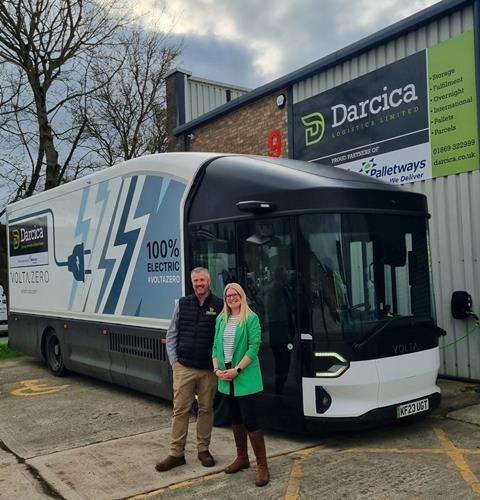
Melanie Tattersall, pictured, has a background in environmental management and, as well as being a member of the Oxford Net Zero Transition Forum, drives the company’s sustainability action plan that is part of its accreditation with the scheme.
“The Mission Zero sustainability module aligns with the UN’s 17 Sustainable Development Goals, which is what B Corp does as well,” she says. “So they are very similar but Mission Zero is more relevant to us.”
The plan extends beyond cutting fleet carbon emissions to include areas such as moving from non-recyclable black plastic pallet wrap and plastic bubble wrap to more sustainable packaging materials and a real focus on social values and staff well-being.
“We don’t have any plastic in our pick-and-pack operation,” Melanie says. “We are saving customers 60% of CO2 emissions on every parcel.”
Unlike many in the ecommerce field, Darcica had a very busy 2023 peak.
“On average we pick around 150 orders a day,” says Anthony. “During the Christmas peak we were doing more like 500 to 600 a day. It was all hands on deck – we were working weekends and evenings.”
The firm was also able to call upon its self-employed drivers working on the Amazon contracts.
“We have a pool of drivers so we can pull people in if we need to,” says Melanie. “That really helps. We also have local people who want part-time work and we will both spend time in the warehouse helping when necessary.”
The company employs five people in the warehouse – one example of how it looks after its staff is its investment in electrically heated waistcoats to ward off the winter chills.
Another element of a sustainable business is having a pipeline of talented people and Darcica is keen to promote from within wherever possible.
“Every one of our managers is a former driver,” says Anthony. “Nick, who manages the Amazon contract started as a driver three years ago and our transport manager here started as a driver two and a half years ago. I am a firm believer in developing people and will put them through their HGV test. There aren’t enough drivers and the age profile of HGV drivers is only getting older.
“One of our night trunker drivers is female and she started as an Amazon driver, came over here to drive a van and then progressed through to Class 1. In our first two years we have put five people through their HGV licences.
“We take people and develop them. We pay for their licences and ask them to sign a contract to say they will stay for three years.”
Darcica has covered the north half of Oxfordshire for Palletways for two years and sends three trunks a night to the central hubs in Lichfield and London, using the 18-tonners to make collections and deliveries around the local area. The firm inputs 80 pallets a night and brings back around 120 and is looking to grow its sales to reverse that imbalance.
Anthony says their deliveries are now split more or less 50/50 between business and residential addresses, though in terms of pallet quantities it is more like 70/30 as the home deliveries are usually single pallets.
“Pallet network home deliveries are definitely on the up,” he says. “It used to be all soil and turf but now it is more bathroom suites.”
He does not share the view of some pallet network members that B2C deliveries should attract a premium because kerbside single pallet drops take longer.
“In my experience depot deliveries can sometimes take longer than residential ones,” he says. “We often have to queue to get in and at some of the sites round here it can take us an hour to drop off. With residential you can often have two or three single deliveries you can drop off in quick succession.”
Anthony is happy with the guidelines for home pallet deliveries that put the onus on the driver to assess the risks and only proceed if it is safe.
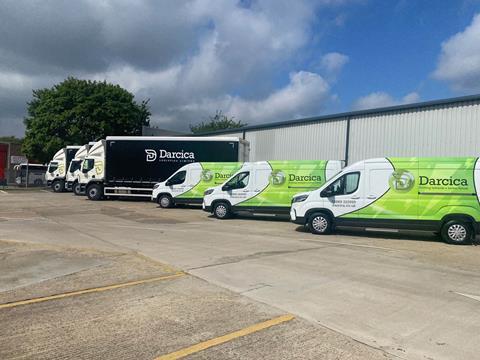
“Let’s deliver a great service but not at the detriment of putting drivers at risk,” he says. “Our insurance premiums went down this year as we have only had two minor incidents in two years. That is down to the effort we put into driver inductions and the tool box talks we do asking them to think about what they are doing.”
Melanie is full of praise for the support Palletways provides. “They put our transport manager through their management training and will often come down to train our customer service staff,” she says. “They share our sustainability goals and are looking at putting in a carbon calculator to measure carbon for their customers on a much wider scale.”
Anthony adds: “Working alongside them has been a dream and I wouldn’t even consider dual networking. Our furthest delivery area is Chipping Norton, about 45 minutes away, which is a trek but we make sure that truck is full and we have enough work to put one truck and one van out there every day.
“They have also helped with depot sales support to find work which is fantastic. I have signed a 10-year contract and I have no interest in working with any other network.”
He is optimistic about future prospects for pallet networks, some of which have struggled to find enough good quality regional hauliers.
“I think there will be an influx of delivery service partners for the likes of Amazon and DPD expanding into trucks,” he says. “There are so many parcel delivery companies out there and the next generation of hauliers will come from the parcels delivery partners wanting to expand into something bigger.
“We are already seeing it with Collect2 up north and Prime Parcel Services where Andy Muir is doing fantastic things and becoming a driving force in Scotland.”
Van drivers need more training
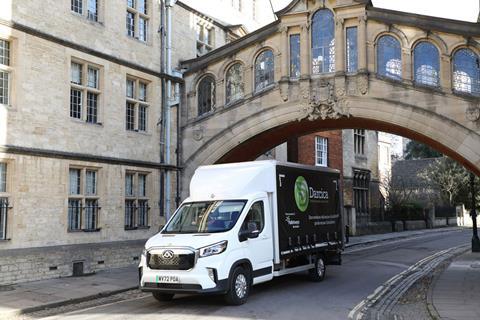
Anthony Tattersall believes that van drivers should be made to pass an intermediate test between car and truck. “We see a lot of damage because people think a van is just like a car,” he says. “It might only be little knocks but that can lead to more and if it seen as the norm that they will hit things that is a real concern. It may only be a day qualification to drive a van but they need something to show they are competent, and this is something Amazon and ourselves are looking at.”
While drivers of vans under 3.5 tonnes are not covered by EU drivers’ hours rules, Amazon has a policy of not allowing drivers to be on the road for more than 9.5 hours a day, six days a week, and this is something Darcica has to monitor and enforce.
“We make sure we don’t over work people,” he says. “We as a business want to look after our people because if you have people working 15 hours a day, seven days a week, that is just not fair or safe.”
Taking care to avoid IR35 pitfalls
The Amazon DSP programme is based on self-employed drivers working for small firms and the model has been thoroughly tested to ensure compliance with IR35. Amazon says of the programme: “As an owner of a parcel delivery business, you will operate with 20 to 40 vans and 30 to 70 drivers. You’ll be fully responsible for selecting and building a group of high-performing, hardworking drivers.”
“A lot of the DSPs are quite small,” explains Anthony. “With 25 or 50 routes we are OK because we are nowhere near a turnover of £10.2m [the threshold for small businesses which do not have to deal with the off-payroll rules]. We lease the vehicles and rent them to the drivers who often have two or three jobs, including driving for us here two or three days a week. They invoice us once a week and Amazon audit us and give us advice to make sure we don’t breach any rules.
“IR35 is always in the forefront of my mind and is something I need to careful of. Whilst the Amazon DSP programme is never going to be affected, because I have a separate side of the business where we do employ people and are building up the turnover, it is something I have always got to be mindful of.”













